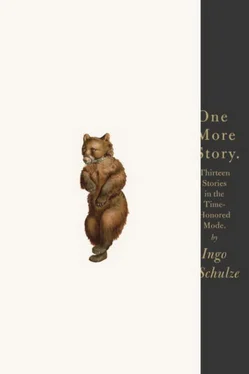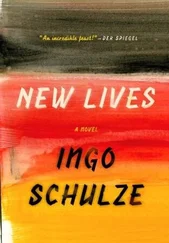Here Henrietta segued to the topic of demons and black magic. Sometimes just a nasty look suffices, and the devil has entered one’s body.
“And what happened to you?” my mother asked.
“No devil in me, but must cleanse myself anyway, everyone must do, you must do — you do too, when Maria comes, everyone invited to me.”
I was ready to return to Dresden the moment the opportunity to make the acquaintance of Mother Maria should arise. Misconstruing my interest, Henrietta poured her heart out to me. She was telling everyone about the cleansing. Her great worry was, however, that she was not up to the task.
Four weeks later we were ringing Henrietta’s doorbell again. Mother Maria was just finishing up the dishes. Before I report about the procedure she put me through, I should also mention that thanks to my mother’s good auspices, I now possessed additional material — I was working on the sequel to my first story — and the only thing I was uncertain about was where to include it. Henrietta had seven sisters and one brother. Her father had fallen in the Great Patriotic War. At age fourteen her brother had stolen a loaf of bread, was arrested at home, and had never returned. She had learned from Maria, however, that he had survived imprisonment in a camp, married, and stayed on in Siberia, where he had died only a few years previously, mourned by his children and grandchildren.
Before proceeding with the treatment we had coffee. Mother Maria was in her midsixties, had a beautiful face and several gold teeth. I would, she announced out of the blue, marry a woman with red hair, presumably a Russian, by whom I would have children.
“We’ll see,” I said, and laughed.
In stocking feet, pants, and undershirt I took up my position opposite her, my face to the window. The sunlight was blinding me. Maria regarded me with a smile, almost mockingly. I grinned back. She didn’t have to put on an act with me.
Maria stepped closer. Without so much as brushing against me, her miracle-working hands slid down from my shoulders and along my arms, then passed from neck to navel.
Translating Maria’s findings, Henrietta announced I had heart and liver trouble. “Yes,” I said. “That’s correct.”
“Fascinating,” my mother whispered.
Maria’s smile vanished. She fixed her eyes on me. It was not clear, however, whether she was inspecting my body or gazing right through me. She slowly lifted her arms. I was waiting to be scanned a third time when she ripped something out of me, ripped it out, wrapped it around her right hand, only in the next moment to shake it off like drops of water. I felt nothing. When she set to work the second time, evidently employing enormous strength in an attempt to tear out a tendon — rip! — I automatically flinched. But, as noted, I felt nothing. And on it went. Inch by inch Maria freed me of various evils and ailments, whereby, as per her diagnosis, there was an especial lot of work to do in the region around the heart and liver. At times it seemed as if the imaginary tendon or fish line from which my ailment hung would slip through her fingers. Then she grabbed hold again, sometimes with both hands. Her face contorted with effort, she squeezed her eyes tight. Meanwhile I was pondering whom Maria might have meant. But of the two redheaded Russian women I knew, I wouldn’t have either as my wife. Finally — it had already grown dark — Maria turned to the treatment of my head.
“Khorosho,” she said at last with a nod. We had not turned on any lights, and the only illumination in the room came from the streetlamps, but I could see how exhausted Maria was. She sank into the armchair my mother had just vacated, and closed her eyes.
I dressed and drank another cup of coffee. My mother gave Henrietta a hundred marks to pay for Maria’s trip home. Maria was not allowed to accept money. Money would rob her of her powers.
I was feeling a bit queasy. I pressed my mother for us to depart. As if observing a minute of tribute, we then stood silent before Maria, now asleep in the armchair.
In the elevator at last, and before I could say a word, my mother pulled two of Henrietta’s gaudy pictures of saints from her pocket and held them out to me. “Do you want this one or this one?”
In almost the same instant my mother’s mouth wrenched, she stared at me. Her eyes seemed suddenly to grow larger as if she had just donned a pair of thick-lensed glasses. She backed up against the wall of the elevator, but then immediately bent forward again. I was about to ask what in the devil was wrong with her. But suddenly her face was far away, my knees buckled, I fell backward, slid to the floor, heard a shrill cry that made me want to laugh, and let out another squeal. A foul odor assaulted my nose, I felt as if I were being crushed.
As the elevator door opened, an elderly couple recoiled in fright. They eyed me warily and only slowly approached again. I didn’t know how it could have happened or why I was still lying as if paralyzed at their feet. I had evidently stumbled, sending me sprawling. Mother helped me up. But because she was in far too great a hurry, I fell again. The couple didn’t budge. “Did you hear that?” the man asked. His wife nodded. They whispered and gawked at us. I understood “writer” and something else that I won’t repeat here.
“What a pig!” the woman suddenly cried — and loudly enough for the whole building to hear. “What a bunch of pigs!”
I wanted to reply that anyone could stumble and a little accident was no reason to insult me and be rude to my mother besides. They, both of them, needn’t act so highfalutin. The way this place looked, walls all smeared over, and the stench — well, thank you very much, but I wouldn’t want to spend a single night here. But instead I let out a disgusting belch.
“Pig!” the man shouted.
“Jackass!” I hissed.
“Pig!”
“Jackass!”
We stood toe to toe, sneered, and went on calling each other “Pig!”—“Jackass!”—“Pig!”—“Jackass!” until Mother dubbed my opponent a “limp pickle.” She said it softly, more as if to herself. She didn’t even say, “You limp pickle,” but simply “Limp pickle.”
“What, whaaat …?” the man said, whirling around.
“Limp pickle!” she said, and pulled me along with her, out to the parking lot.
“What, whaaat …?” he shouted, following us. But his voice now sounded so strangely drained that I looked back. He was in fact gasping for air, his eyes bugged out.
My mother quickly brushed the dirt from my pants and jacket, piloted me into the shotgun seat, and swung in behind the steering wheel. She made me spit on her handkerchief, which she used to scrub my right cheek. I hate handkerchiefy spits-and-scrubs, but this time I didn’t fight back, in fact I did what I could to help my mother’s efforts and pushed my hair out of my face. In the sun-visor mirror I watched the man brace himself against the car trunk. His blue-lipped fish mouth looked as if it were trying to continue to shout, “What? Whaaat …?”
“Limp pickle,” my mother said with satisfaction, started the engine, and drove off. The man vanished from the mirror. Exhausted by a surfeit of impressions and at a loss how to appropriately order or refine them, I closed my eyes.
Faith, Love, Hope Number 23
When Marek awoke he was alone in bed. There was a smell of coffee. If he opened his left eye, the sun burned a hole in the window casings. But with just his right eye, the room regained its clear contours: an old wardrobe, an unframed mirror, two chairs, and a clothes tree, with just one hanger, on which his jacket was draped. If he banished the posters and the big, smudged glass vase in the corner, the space looked like the hotel rooms in Osnabrück and Münster where as a ten-or eleven-year-old he had stayed with his father when the two of them had attended houseware trade fairs.
Читать дальше












